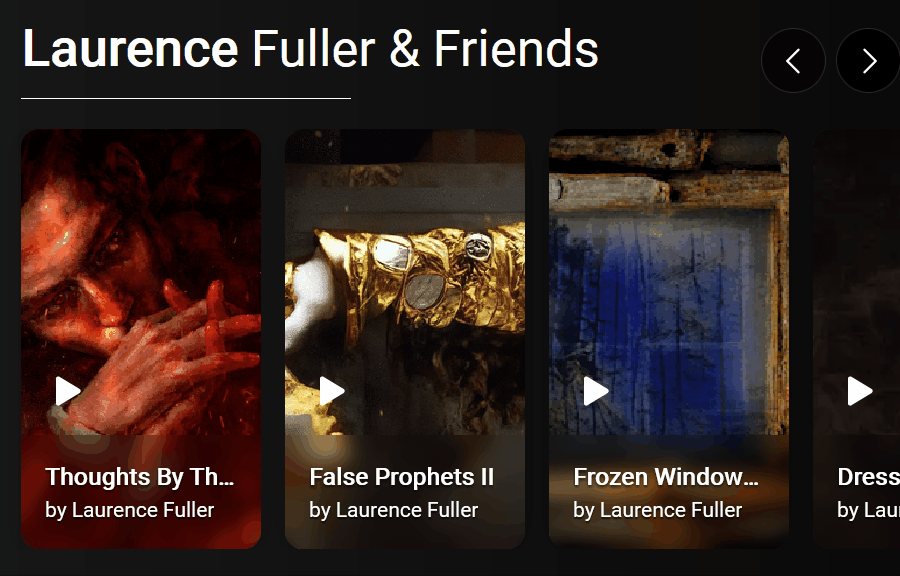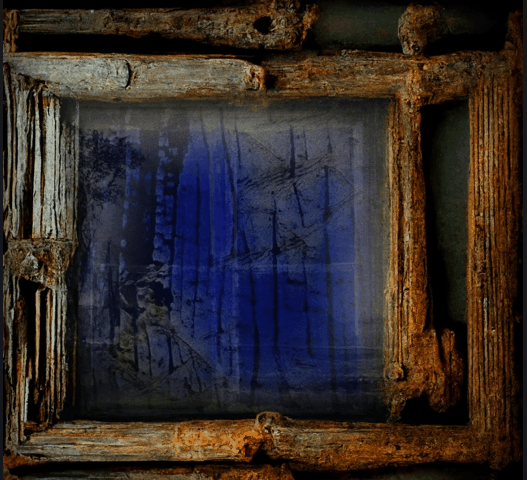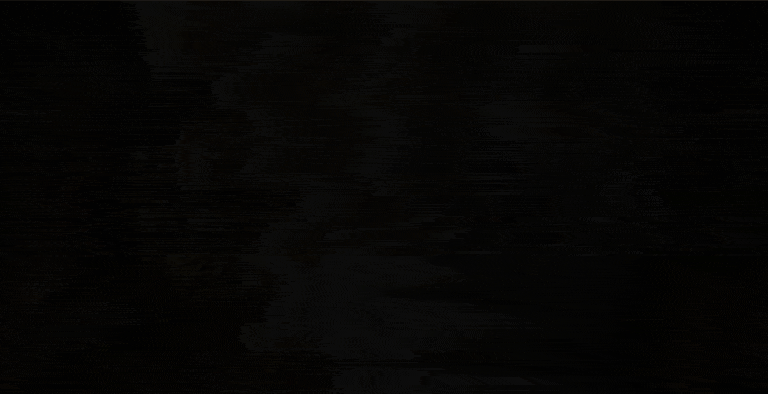Welcome to the latest installment of our Community Spotlight series. This week's guest was an absolute pleasure to have on. It resulted in some of the meatiest conversations yet. We'll have a full transcript available of the interview as per usual, as well as an NFT of the interview minted. Laurence and I chatted for almost two straight hours, so we can't touch on everything, but there were a lot of gems to chose from for this post.
Laurence Fuller is a fine art poet and actor who has been active in the NFT space for a very long time. He's worked with an outrageous number of talented artists to create some of the most compelling and interesting works around today. Every piece he creates is like a mini-performance that he puts on. His voice is an instrument and he doesn't ever seem to disappoint.
He's one of the best advocates for the web3 space there is, and he treats everyone with respect. It was a joy to share a conversation with him and we look forward to doing more in the future.
But the show must go on, so let's recap some of the best bits.

The Recap
On the inevitability of growing
DK: It's crazy how integrated this has become, it's grown me into appreciating artwork a lot more as well as the driving forces behind it, especially after having met so many brilliant artists like yourself.
LF: I think it was inevitable that - for probably all the artists in the room - I don't want to say taste, but just, their taste for art would really develop, grow, and become an integrated part of their activities in the space, even if they had no sort of connection to art or interaction with it beforehand. Because the more exposure you get to something like art, the more it just becomes a part of your vocabulary and a part of your, your life. So it was inevitable.
On his first reaction to Tezos
DK: I remember feeling so confused hearing about Tezos for the first time last March. I'm checking it out, and kind of learning the ecosystem. My mind was melting. I was like, "Why isn't everyone just using this? This is so great. What are we even doing, people?"
LF: I thought, when I came over, I was like, okay - everyone's gonna come over in like five days. Like, see you guys, see you guys next week! But no - it took like, a year and a half.

On his dream collaboration
DK: Who who would you want to collab with that you'd fanboy over, who would make you the most nervous to work with because you adore them so much?
LF: Someone who has been a hero of mine, although he's dipped from acting and public life altogether, is Daniel Day Lewis. His father was the poet Cecil de Lewis. But I think, Daniel has written poetry. But I also think he's completely um, you know, he has a very difficult relationship with the public world and also the world of commerce - a super old fashioned guy, so I don't think it'll ever happen. But Anthony Hopkins, maybe. You know, he's seems to be a degen and so-
DK: He's a degen?
LF: Anthony Hopkins, yeah, you didn't see he's been posting on Twitter that he, he went on OpenSea and bought some PFPs?
DK: No I didn't, I must have missed it. That's pretty funny though.
LF: I mean, I was very hopeful when Anthony Hopkins - Sir Anthony, I should say, posted his first, "Checking out the NFT scene, show me so some stuff"- I was optimistic that he would be interested in either works on SuperRare, or maybe even Tezos. That's a long shot, but you know, maybe something that's on SuperRare.
But no, turns out he's a full on degen. 100%, a degenerate. So Anthony, he's in it for the next cycle already looking at his exit liquidity.
On selling out
DK: Laurence is talking about taking one for the team by being in an Avengers movie. Like, "I don't want to do it, but I'll do it. Oh boy"
LF: My mind immediately goes to Miles Teller in the Fantastic Four. I think that is one of his biggest regrets. He's all strapped up in spandex and the film was a total flop. I remember a lot of people in Hollywood saying, like, "Oh, that poor guy, his career's done, and it's not his fault." But look at what Miles Teller has gone on to do after that, you know, now he's one of the top leading men of our generation, and he's fantastic as an actor.
So I know, there's lots of shades of grey when it comes to that stuff. But there's also a lot of stuff that is very commercial and would be pumped out there. That just would not do you any favors whatsoever as an actor. So if you're going to, if you're going to sell out, you got to make sure you sell out for the right thing.

On artificial intelligence's role in creating art
DK: Where do you stand currently with the AI artwork as a genre? What are your quick thoughts on on that? And maybe, what do you think the future is going to look like with with all these AI tools?
LF: Yeah, I think it's basically a tool for storytelling.
We haven't really had access to this before. You're sort of giving this immense creative power into the hands of literally anybody. I mean, I'm sure we can all envision a future where an AI app is about as accessible as Twitter. And it's about this readily downloaded stuff, even TikTok Kevin AI thing at the moment, it's not very good. It's like one of the first iterations of AI technology, and the images that it creates are not very good.
But they're already implementing it, so surely soon enough, you'll be able to type in "whatever Picasso" and then it'll make you an iteration of something like a Picasso. I'm sure that breaks a ton of artists hearts, but it is a reality that's happening. And it's an unstoppable reality. Whether you believe it to be unethical or not, it will happen. So the way I think, you know, as an artist who's interested in how to tell authentic stories, and create authentic pieces of artwork, using it as a tool for storytelling, and really what my contribution is, is a story.
Of course, you know, the editing that goes into touching up the pictures, animating them together, like I did with the piece up in the nest, The Walrus, and The Carpenter. I made those still images from Midjourney, I animated them blending video footage, and then edit the edited the shots together, in, you know, a sequence that went with the story of the walrus, and the carpenter created the music using orchestra tools. And that's my performance, obviously. So it was my way of telling Lewis Carroll's story.In adapting it and interpreting it, as a filmmaker would go about adapting interpreting a script.
On his favorite video artist
LF: Actually, my favorite video artist is Matthew Barney, who does these eight hour long Performance Art affairs that can get pretty abstract. There's times where he's like, covered in wax, and sort of climbing the inside of a museum, half dressed as a woman, with a pink kilt. And he's got this beefy hat, you know, those, like the soldiers that stand outside Buckingham Palace. And he's jacked, he's got, this napkin that's like, shoved in his mouth, but as if it were made out of wood or something. So the makeup is made to look like it's sort of, ruptured his mouth, and it's just lodged in there.
He's climbing, like scaling the inside of the museum, you know how it's a spiral upwards. Then on each level, he encounters these sorts of strange scenes, like a row of girls dresses, in mouse costumes, tap dancing. At the top, there's a sculptor who's like, seems to be welding, this hot metal, which is running down it, and, and I sound like a lunatic just describing it, but it's brilliant, you know? And it goes on for eight hours called the Cremaster Cycle.
It took about 20 years to make about eight of these. And it's video. I think you can get sort of iteration of it on DVD now. But to see, like, the full experience of the eight hours, you've had to go to, I think like MoMA would screen it. So you'd have to go into a museum and it would screen. They did have some way of selling an exclusive DVD to private collectors for a lot of money. I think I've seen some of them, like these DVDs go for like $100,000.

On cinema/movie NFTs
DK: Have you explored any, like, cinema NFTs? I don't think most blockchains are equipped to handle file sizes like that, but I think that's - well I digress, what I'm asking is, have you thought about what an NFT movie would look like? Or how you would use that? Is that a rabbit hole you've gone down?
LF: That was one of the first things that I experimented with, with the team, an independent film crew that I worked with called Five Families. And it didn't, it didn't really get any traction. The way that we dropped it, I think, was way too early. We're talking about like, March of 2021. The way that we structured it, I don't think was that enticing, but also the concept itself. There's something about it, that's not quite clicking.
And, you know, the NFT scene, the way that the whole ecosystem is coming together. It's not quite clicking. I think you would have to do a big project, even though it's an independent film. I mean, the NFT project would have to be a big one. I don't think it would be an easy job. Maybe you could do a film alongside a 10K PFP, or something like that. That is something I'm looking at.
On conceptualizing his work
Kaili: Hi. Hello, I have a question for Lawrence. I was looking through your work. I followed you earlier this week. And I truly enjoy the animation and the cinematic quality to what I've seen on your profile. I just am really curious: what is your conceptualization process? You mentioned just a moment ago that you you created these works inspired by poetry? I'm curious how you conceptualized that, and what was your process for the visual creation of your work?
LF: Yeah, thank you. I mean, about half, probably more than half, most of my pieces are from my original poetry. And so that sort of comes to me, either just by writing whatever it is on my mind, reading a lot of poetry, going out and walking around, thinking about things, talking to myself like a crazy person, and then writing it down on paper. Or, if there's some sort of specific events in my life, or even things that sometimes - not all the time - things that happen in this space which affect everybody emotionally, including myself. It inspires a poem in me and then I start writing it, and you know, sort of finding metaphors for the adventure and basically, the storytelling comes from that. So it's really as personal as it can possible as can be. It's really like what goes on in my head and what I'm feeling. Then I thought to create stories out of that.
In the case of The Walrus and The Carpenter up above, Lewis Carroll did all that, the hard craft of writing the poem a couple hundred years ago, and I had the joy of interpreting it. Which is something that was sort of instilled in me, to interpret the classics. That that was something important to keep these stories alive, like Lewis Carroll, like Shakespeare, like William Blake, the poetry in the plays of the Renaissance period, particularly, for me, in Europe, and England and France a little bit. Because that was just my background.
Training in classical theater in England, you know, they really instilled in all of us that, to be like a bastion of culture, you have to bring these things back to life in the present, and find why they're relevant to contemporary audiences. And because the universal stories in the first place are about sort of humanity, and they're about power and love and desire and disappointment. A lot of the greatest dramas and tragedies were written hundreds of years ago, so that's something that I'm constantly gaining inspiration from. And yeah, I'll contemporize, the classics.

On being featured by DNS
LF: I'm very grateful for you showcasing my work and holding the space. I think what you guys are doing at DNS is fantastic. The comparison with LooksRare, I totally see that happening. And on the dev side, it's all for the taking for anyone that has the gusto to do it. And you guys have got some gusto. So I love what you're putting together, and I can't wait to see how it unfolds.
DK: Thank you. We're pleased to hear that. We work pretty hard at DNS, and it's, we've got a pretty stellar team. For myself, it's been an absolute privilege to work with these other guys who aren't here right now. But we're all going to be meeting together as a team for the first time next Tuesday, in Paris, which is awesome. But it really feels like we're building something with an unbelievable amount of potential. I wouldn't want to be doing anything else right now.
Wrap Up
The last thing to mention is the special drop that we're helping him out with. Details are in his tweet right here. 👇
The Walrus & The Carpenter 🥀🔥
— Laurence Fuller (@LaurenceFuller) September 4, 2022
Coming to https://t.co/u3dluUSE94 #tezos @dns
To claim ~ must hold one copy of Jabberwocky & burn one https://t.co/qdD5N8egaC
10 will be listed for sale after claims have been made 🔉 pic.twitter.com/OQrOwpxHug
Thanks for checking out the community spotlight. We should have another one coming up again, very soon. If you or someone you know would like to be considered, please let me know! And as always, Discord is always a great option for reaching out to us too.